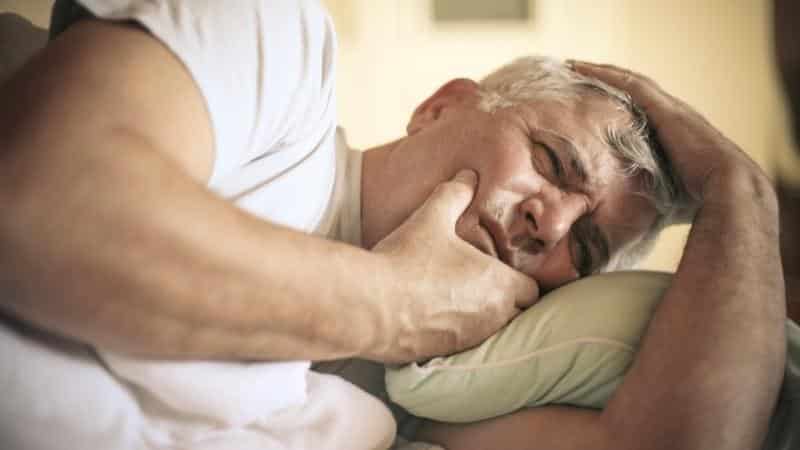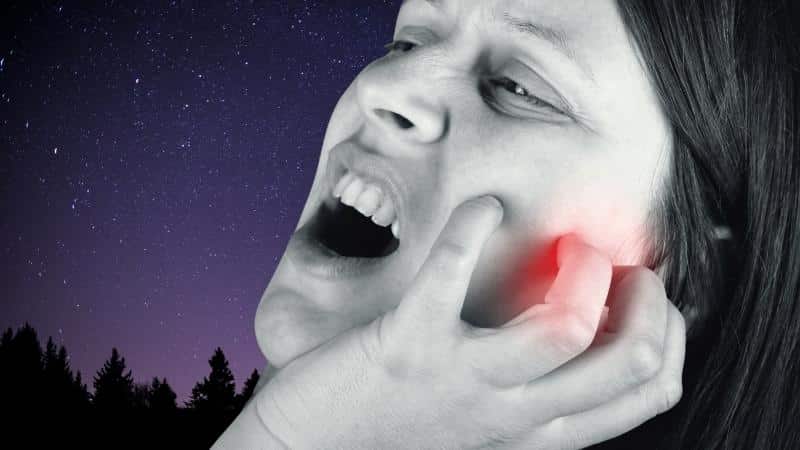A toothache is a pain around or in a tooth that can be either minor or serious, depending on the cause. It is the worst experience after a long day, and you want to retire to your comfortable bed peacefully, but then you realize that you have a nagging toothache.
Mostly, people do not feel their toothache until they rest on their bed for a night’s sleep. Unfortunately, you will stick with your throbbing tooth all night since you can’t meet your dentist in the middle of the night.
Read to the end to learn about tips you can use to reduce toothache at night.
What Causes Toothache?

Whatever the source, having a toothache at night makes it difficult to get a decent night’s sleep. It is crucial to learn how to sleep while suffering from a toothache.
Cavity/Tooth Decay
A dental cavity is the most frequent reason for toothaches. Cavities are usually caused by poor oral hygiene (failure to brush or floss regularly).
They leave a tiny hole in your tooth, which has the potential to enlarge and deepen with time. Additionally, cavities can develop when sweet meals and saliva combine, causing your tooth to erode.
Cavities are difficult to detect early since they are initially hardly visible, increasing the likelihood that a toothache will arise later. Visit the dentist frequently for cleanings to prevent cavities from developing. Untreated cavities can infect the tooth, resulting in tooth loss or even worse.
Abscessed Tooth
An infection that has spread to the tooth’s “pulp chamber,” also known as the root tip or the area around the root, is referred to as an abscessed tooth. The consequences include an infected root, swollen gums, severe pain, and possible bone loss at the site of the infection.
Gum Disease
Most people over 35 years are more likely than not to get gum disease, also known as periodontal disease. The most typical form of gum disease is gingivitis, while more severe periodontitis affects 5%–15% of people.
The main cause of this disease is the plaque buildup due to bad dental hygiene. The germs will eventually cause your gums to enlarge, bleed, and turn red. Many gingivitis patients have no pain, but tooth loss may occur if the condition is not addressed.
Injury/Trauma
A dental accident resulting in a shattered tooth or tooth being knocked out is one of the more evident causes of toothaches. Make an appointment with your dentist right once to have the tooth corrected if this occurs to you.
Wisdom Teeth
If you still have your wisdom teeth and have pain in the upper back and bottom molar region, it’s likely to have them extracted.
Significant discomfort may result if wisdom teeth are not extracted when ready to come out. You’ll feel a sore and potentially red area at the back of your mouth around your molars if your wisdom teeth are about to erupt.
This discomfort won’t go away as your wisdom teeth develop, especially if they develop sideways or in an unnatural position. They may press against nearby teeth, bones, and nerves if this occurs.
Teeth Grinding
While you may believe that toothaches are only brought on by bad dental habits, such as teeth grinding and erupting quickly (usually the case). The temporomandibular joint (TMJ), which connects the lower jaw to the skull and allows you to chew and speak, can cause tooth pain.
The moment you clench your jaw or grind your teeth, you put extra strain on your jaw muscles and deteriorate your teeth, which can cause tooth discomfort and possibly TMJ or TMD problems. Your dentist can provide a dental splint to realign the lower jaw if you suffer from TMJ symptoms. Additionally, relaxing with a warm compress on your jawbone and consuming more soft meals might help you feel less stressed.
Abnormal Bite
An abnormal bite, like teeth grinding, also brings on TMJ condition. Your lower teeth should just barely fit over your upper teeth. Malocclusion, another name for a misaligned bite, is when the top and bottom teeth come together improperly.
When biting or eating, an irregular bite may be unpleasant or uncomfortable. Most often inherited, malocclusion is not the most frequent reason for dental pain. However, if it does, it may manifest at any moment during your lifetime.
Why is a Toothache Often Worse at Night?

A toothache greatly stimulates your nerves at midnight. Your brain is stimulated by this sensation, keeping you awake. Toothaches not only keep you awake but also interfere with your ability to fall asleep.
Several factors can make your toothache worse at night when you’re attempting to sleep. Some of these motives include:
What you eat for dinner
After supper, toothaches tend to get worse, and the throbbing can last all night if you eat a large meal. Additionally, if you eat anything cold, hot, acidic, sweet, or starchy with your meal, it can worsen your dental problems and cause extra pain.
Jaw clenching throughout the day
When you’re anxious or stressed, you could unwittingly or unknowingly clench your jaws or grind your teeth throughout the day. This can cause your pain to intensify during the night.
Your sleeping position
When you get into bed and lay down, more blood rushes to your brain, creating significant pressure on the delicate tissues of your mouth. Due to the way you sleep this causes a more severe toothache.
Brushing your teeth before bed
Even while brushing and flossing at night is essential for good oral health, doing so can aggravate the area where a toothache is present, particularly if your toothbrush has firm bristles.
Reduced distractions
The evenings are a time of relaxation for many people. Your mind may be less active and more likely to be predisposed to focus on your toothache pain if there are less typical daytime diversion opportunities.
Best Position to Sleep in When Having a Toothache
Elevating your head while in bed is the most effective strategy to sleep through a toothache. By doing this, you can lessen the impact of high blood pressure to your head. You might experiment to achieve a relaxed sleeping position while elevating your head.
Using a high-quality cushion can be beneficial. Hybrid foam pillows are great for this as they are often very lofty while still providing great comfort. But if you can’t get your hands on one of those, any high lofted pillow will serve you well.
Tips For Reducing Your Toothache at Night
Use an over-the-counter pain reliever
Take over-the-counter pain medicine, such as Advil, Motrin, or Tylenol, to ease your toothache. You can also sleep by reducing dull pain with a benzocaine-containing numbing plaster or lotion. Avoid giving them benzocaine-containing items if your child is less than two and has a toothache.
Sleep with your head elevated
Some people discover that sleeping on their sides while suffering from toothache also works. Blood won’t rush to your head if you elevate your head above the level of your body. This will prevent blood from accumulating and lessen toothache sensitivity.
Watch what you eat
Before going to bed, it’s best to stay away from any foods that can make you feel worse, such as those that are acidic, cold, or hard. Depending on the source of your discomfort, chewing with the hurt tooth could result in further harm, so you should wait to apply pressure to it until the problem has been resolved.
Rinse your mouth
To stay comfortable, use mouthwash that has both a disinfectant and an anesthetic. Use a solution of salt and water to swirl about if you don’t have any mouthwash. The easy home cure works wonders for relieving pain while also helping to reduce inflammation and fight infections.
Use a cold compress
Before retiring to bed, cover an ice pack with a soft cloth or towel and apply it to the exterior of your face. Applying a cold compress will reduce swelling and dull your pain.
Salt water rinse
A typical home cure for a toothache is a simple salt water rinse. Salt water may lessen inflammation because it is a natural antibacterial agent (Reliable Source). In turn, this helps to prevent infection around broken teeth. You can clear any debris or food particles lodged in the gums or teeth by rinsing with salt water.
Clove
One of the primary components in cloves, eugenol, can ease dental pain. According to a clinical experiment conducted in 2015, participants who administered eugenol to their gums and tooth sockets after extraction experienced reduced discomfort and swelling.
Eugenol has analgesic properties, which means it numbs the area. Make a paste out of ground cloves by soaking them in water to treat toothaches. The paste should then be applied to the tooth or placed in the mouth using an empty tea bag.
Garlic
Some individuals utilize the common household component garlic to treat toothaches.
The primary component of garlic, allicin, has potent antibacterial properties.
A reliable source that could aid in eliminating the oral bacteria that causes tooth pain and cavities.
The discomfort may be eased by chewing a clove of garlic and letting it rest next to the tooth. But not everyone will find this the best option, as some individuals find the taste of raw garlic to be overpowering.
When Should You Schedule an Appointment With Your Dentist?

You should see a dentist as quickly as possible if you have a toothache at night. Home cures only provide short-term alleviation. A person may require antibiotics to treat the infection if additional symptoms of infection accompany the toothache.
An individual should visit their dentist if a fractured or decaying tooth is causing pain. They’ll be able to come up with a long-lasting answer. Ignoring tooth pain as a sign of tooth decay can result in more severe problems such as abscesses, gum disease, and tooth loss.
Bottom Line
A toothache is a painful situation to be in. Numerous home cures can offer short relief and aid sleep, but they are not long-term fixes.
Anyone who has a toothache for more than a day or two without showing signs of a sinus infection should visit a dentist for a complete evaluation and course of treatment.
